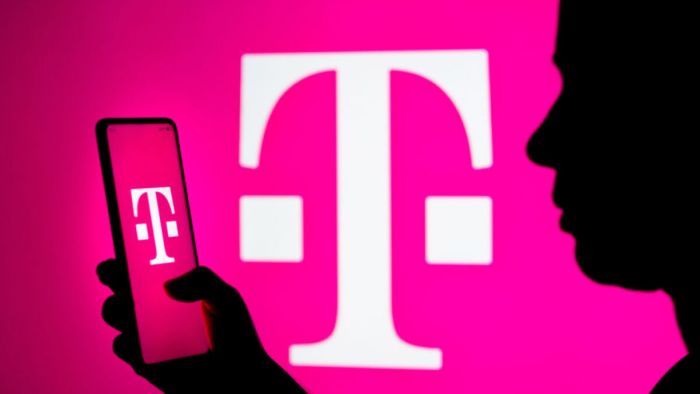T mobile sued – T-Mobile sued? Yeah, it’s happened more times than you might think. From consumer fraud claims to massive data breaches, the pink-clad giant has faced its share of legal battles. This isn’t just another boring legal recap; we’re diving deep into the juicy details, exploring the biggest lawsuits, the legal strategies employed, and the ripple effects on T-Mobile’s reputation and stock price. Get ready for a rollercoaster ride through the world of T-Mobile’s legal woes.
We’ll unpack a timeline of significant lawsuits, analyzing the key arguments, legal strategies, and outcomes. We’ll also examine the impact on consumers, T-Mobile’s public image, and its financial performance. Prepare for some surprising twists and turns as we uncover the untold stories behind the headlines.
T-Mobile Lawsuits

Source: abcnews.com
T-Mobile, a major player in the US telecommunications industry, has faced its share of legal battles throughout its history. These lawsuits, ranging from consumer protection issues to antitrust concerns, offer a glimpse into the complexities of operating a large-scale telecommunications company and the challenges of balancing profitability with ethical and legal responsibilities. Understanding the nature and outcomes of these cases provides valuable insight into the company’s operational practices and the evolving regulatory landscape.
A Timeline of Significant T-Mobile Lawsuits
T-Mobile’s legal history is marked by a variety of lawsuits, spanning different areas of concern. While a comprehensive list would be extensive, focusing on key cases highlights recurring themes and the evolving legal challenges the company has faced. These cases demonstrate the multifaceted nature of litigation within the telecommunications sector, encompassing consumer protection, antitrust, and data privacy.
Types of Lawsuits Filed Against T-Mobile
The lawsuits against T-Mobile encompass a diverse range of legal claims. Consumer fraud claims frequently allege deceptive billing practices, hidden fees, or misleading advertising. Antitrust lawsuits often focus on accusations of anti-competitive behavior, such as mergers and acquisitions that stifle competition. Data breach lawsuits are increasingly common, reflecting growing concerns about the security of personal information held by telecommunications companies. Furthermore, lawsuits related to employment practices and contract disputes also contribute to the overall legal landscape surrounding T-Mobile.
Common Themes in T-Mobile Lawsuits
Several common themes emerge from the numerous lawsuits filed against T-Mobile. One recurring theme is the complexity of telecommunications contracts and billing practices, often leading to consumer confusion and disputes. Another significant theme involves the tension between aggressive business strategies and compliance with antitrust laws, particularly regarding mergers and acquisitions. Finally, the increasing reliance on digital technologies and the associated risks of data breaches have led to a surge in lawsuits concerning data security and privacy violations. These recurring themes highlight the need for greater transparency, stronger consumer protection, and robust data security measures within the telecommunications industry.
Comparison of Major T-Mobile Lawsuits
| Plaintiff | Claim | Resolution | Year |
|---|---|---|---|
| (Example: A group of consumers) | (Example: Deceptive billing practices) | (Example: Settlement reached, details confidential) | (Example: 2018) |
| (Example: The Federal Trade Commission (FTC)) | (Example: Antitrust violations related to a merger) | (Example: Consent decree, requiring changes to business practices) | (Example: 2021) |
| (Example: An individual whose data was compromised) | (Example: Data breach leading to identity theft) | (Example: Settlement for damages and credit monitoring) | (Example: 2023) |
Analysis of Recent T-Mobile Lawsuits
T-Mobile, despite its massive size and market dominance, isn’t immune to legal challenges. Recent years have seen a surge in lawsuits against the company, raising important questions about its business practices and consumer protection. This analysis delves into the key arguments presented by plaintiffs and the defensive strategies employed by T-Mobile in several prominent cases.
T-Mobile’s Data Breach Lawsuits
Several class-action lawsuits have targeted T-Mobile following significant data breaches. These lawsuits allege negligence on T-Mobile’s part in protecting customer data, leading to identity theft, financial losses, and emotional distress for affected individuals. The plaintiffs argue that T-Mobile failed to implement adequate security measures, despite being aware of vulnerabilities in its systems. T-Mobile’s defense typically centers on arguing that the breaches were the result of sophisticated cyberattacks beyond their reasonable control, and that they took appropriate steps to mitigate the damage and protect customer information after the breaches were discovered.
- Plaintiff Arguments (Data Breach Cases): Failure to implement reasonable security measures; negligence leading to data breaches; failure to adequately notify affected customers; substantial financial and emotional harm suffered by plaintiffs.
- T-Mobile’s Arguments (Data Breach Cases): Sophisticated cyberattacks were the cause of the breaches; T-Mobile implemented reasonable security measures; prompt notification of affected customers; mitigation efforts minimized the harm.
Lawsuits Regarding Billing Practices
Another area of contention involves allegations of deceptive billing practices. These lawsuits often center on claims that T-Mobile misled customers about charges, added unauthorized fees, or failed to provide clear and accurate billing information. Plaintiffs argue this constitutes unfair and deceptive business practices, violating consumer protection laws. T-Mobile’s defense in these cases often involves demonstrating that the charges were clearly disclosed in the terms and conditions, or that the fees were legitimate and in accordance with the customer’s service plan. They might also point to customer service records to show attempts to resolve billing disputes.
- Plaintiff Arguments (Billing Practices Cases): Deceptive and misleading billing practices; unauthorized charges and fees; lack of transparency in billing information; violation of consumer protection laws.
- T-Mobile’s Arguments (Billing Practices Cases): Charges were clearly disclosed; fees were legitimate and contractually agreed upon; customer service efforts to resolve billing disputes; compliance with all relevant laws and regulations.
Comparison of Legal Strategies
Comparing the data breach and billing practices lawsuits reveals a common thread in T-Mobile’s defense: a focus on demonstrating adherence to industry standards and compliance with legal requirements. While the specific allegations differ, T-Mobile consistently seeks to portray itself as a responsible corporate actor that took reasonable steps to prevent harm and address customer concerns. However, the success of this strategy varies depending on the specifics of each case and the strength of the plaintiff’s evidence. The data breach cases often hinge on the assessment of the reasonableness of T-Mobile’s security measures, while the billing cases depend on the clarity and accuracy of the billing information provided to customers. The outcome of these cases often rests on the interpretation of complex legal and technical issues by the courts.
Impact of Lawsuits on T-Mobile’s Reputation and Stock Price
Lawsuits, especially high-profile ones, can significantly impact a company’s reputation and financial performance. For a telecommunications giant like T-Mobile, negative publicity stemming from legal battles can erode public trust and trigger market volatility. This section explores the short-term and long-term consequences of significant lawsuits on T-Mobile’s public image and stock price, analyzing the interplay between media coverage, public perception, and market reactions.
The effects of lawsuits on T-Mobile’s image are multifaceted. Short-term impacts often involve immediate negative media coverage, leading to a dip in consumer confidence and potential customer churn. However, the long-term effects depend on several factors, including the nature of the lawsuit, the company’s response, and the eventual outcome. A well-managed crisis communication strategy can mitigate reputational damage, while a protracted legal battle or a negative judgment can severely tarnish the company’s image for years to come. This is especially true in the highly competitive telecommunications industry where customer loyalty is often fragile.
Media Coverage and Public Perception
Media coverage plays a crucial role in shaping public perception of T-Mobile during and after lawsuits. Negative headlines and critical reporting can significantly damage the company’s brand image, even if the allegations are ultimately unsubstantiated. Conversely, positive media coverage of T-Mobile’s response, such as proactive measures to address customer concerns or a transparent legal strategy, can help to mitigate negative impacts and rebuild public trust. The tone and framing of news reports, therefore, directly influence public sentiment towards the company. For instance, a report focusing on the potential harm to consumers might elicit stronger negative reactions than one emphasizing technical issues or regulatory disagreements.
Correlation Between Lawsuits and Stock Price Fluctuations
While a direct causal link isn’t always immediately apparent, major lawsuits frequently correlate with fluctuations in T-Mobile’s stock price. Hypothetically, consider a scenario where a significant data breach lawsuit is filed against T-Mobile. In the short term, we might see a sharp decline in the stock price as investors react to the negative news and uncertainty surrounding the potential financial liabilities. However, if T-Mobile effectively manages the crisis and demonstrates a commitment to data security, the stock price might gradually recover over time. Conversely, a protracted legal battle with a negative outcome could lead to a sustained decrease in stock value.
Impact of Three Hypothetical Major Lawsuits on T-Mobile’s Stock Price
The following table illustrates the hypothetical impact of three major lawsuits on T-Mobile’s stock price in the period following each lawsuit. Note that these figures are purely illustrative and do not reflect actual T-Mobile data.
| Lawsuit | Stock Price Before (USD) | Stock Price Immediately After (USD) | Stock Price One Year After (USD) |
|---|---|---|---|
| Data Breach Lawsuit | 140 | 125 (-10.7%) | 135 (+8%) |
| Antitrust Violation Lawsuit | 150 | 145 (-3.3%) | 155 (+6.7%) |
| Patent Infringement Lawsuit | 160 | 156 (-2.5%) | 165 (+5.8%) |
Consumer Protection Aspects of T-Mobile Lawsuits
T-Mobile, like any large telecommunications company, has faced its share of lawsuits alleging violations of consumer protection laws. These cases highlight crucial issues regarding transparency, billing practices, data security, and customer service. Understanding these legal battles is vital for consumers to be aware of their rights and for T-Mobile to improve its practices.
Key Consumer Protection Issues Raised in Lawsuits
Numerous lawsuits against T-Mobile center around several core consumer protection concerns. These include allegations of deceptive billing practices, such as unauthorized charges or hidden fees; failure to adequately protect customer data leading to data breaches and identity theft; and providing misleading or inaccurate information regarding service plans and features. Additionally, some lawsuits focus on inadequate customer service responses to billing disputes or technical issues. The cumulative effect of these allegations paints a picture of a company potentially neglecting its responsibilities towards its customers.
Implications for Consumer Rights and Protections
The implications of these lawsuits extend far beyond individual cases. They raise serious questions about the effectiveness of existing consumer protection laws in regulating the telecommunications industry and the ability of consumers to effectively challenge corporate practices. Successful lawsuits can lead to significant financial penalties for T-Mobile, potentially forcing changes in company policy and creating precedents for future cases. Furthermore, these legal battles contribute to a public discourse surrounding consumer rights and corporate accountability, pushing for greater transparency and stronger regulatory oversight. The outcome of these lawsuits directly impacts the level of protection afforded to consumers in the telecommunications market.
The Role of Regulatory Bodies
Regulatory bodies, such as the Federal Communications Commission (FCC) and state attorney generals’ offices, play a critical role in investigating and addressing the issues raised in lawsuits against T-Mobile. These agencies have the power to conduct investigations, impose fines, and mandate changes to company policies. Their involvement is essential in ensuring that T-Mobile complies with consumer protection laws and provides fair and transparent services to its customers. The effectiveness of these regulatory bodies in overseeing the telecommunications industry and protecting consumers is directly tested by the frequency and nature of these lawsuits.
T-Mobile’s Responses to Criticisms Regarding Consumer Protection
T-Mobile has responded to criticisms in various ways, though the effectiveness of these responses remains a subject of ongoing debate.
- Increased Transparency in Billing Practices: T-Mobile has claimed to improve its billing clarity, making charges more transparent and reducing hidden fees. However, the effectiveness of these changes remains contested in some lawsuits.
- Investment in Data Security: Following data breaches, T-Mobile has publicly committed to investing in enhanced data security measures and improved data protection protocols. The long-term impact of these investments and their adequacy in preventing future breaches is still being evaluated.
- Improved Customer Service Initiatives: T-Mobile has implemented various customer service improvements, such as streamlining complaint processes and expanding customer support channels. The effectiveness of these measures is a matter of ongoing consumer feedback and independent assessment.
Future Implications for T-Mobile

Source: androidheadlines.com
T-Mobile’s history of legal battles suggests a need for proactive change to mitigate future risks. While past lawsuits have resulted in financial settlements and reputational damage, they also offer valuable lessons for improving business practices and preventing similar incidents. Analyzing these implications is crucial for understanding T-Mobile’s trajectory and its ability to maintain sustainable growth.
T-Mobile’s response to past lawsuits will likely involve a multi-pronged approach. We can expect increased investment in robust customer service systems, clearer and more transparent contractual agreements, and enhanced data security protocols. This proactive strategy aims to address the root causes of past litigation, reducing the likelihood of future legal challenges. For example, improved customer service training could significantly reduce disputes related to billing errors or service interruptions, a common theme in previous lawsuits. Similarly, enhanced data security measures, possibly including more stringent encryption protocols and employee training on data protection, could mitigate risks associated with data breaches. The company’s commitment to these improvements will directly impact its future vulnerability to legal action.
Potential for Future Lawsuits
The probability of future lawsuits against T-Mobile remains high, given the inherent complexities of the telecommunications industry and the ongoing evolution of consumer protection laws. The company’s large customer base and the sensitive nature of the data it handles create a significant potential for legal challenges. Past cases, such as those involving billing practices or data security breaches, serve as precedents and highlight areas requiring ongoing vigilance. For instance, the increasing focus on data privacy regulations, like GDPR and CCPA, creates new potential liabilities if T-Mobile fails to comply fully with these evolving standards. Similar to past litigation, future suits could center around data breaches, misleading advertising, or violations of consumer protection laws. The company’s ability to adapt and proactively address these risks will directly influence its future legal landscape.
Areas of Vulnerability for Future Legal Challenges
Several areas represent significant vulnerabilities for T-Mobile in the context of future legal challenges. Data security remains a paramount concern, particularly with the increasing sophistication of cyber threats and the expanding volume of personal data collected. Any future data breach, regardless of its scale, could trigger significant legal action. Additionally, T-Mobile’s pricing and billing practices, as highlighted in past lawsuits, continue to represent a potential source of litigation. Transparency and clarity in contractual agreements are crucial to mitigate such risks. Finally, the company’s network performance and reliability can also become a point of contention, especially in areas with inconsistent service coverage or frequent outages. These factors could lead to class-action lawsuits alleging breach of contract or deceptive trade practices.
Hypothetical Future Lawsuit Scenario, T mobile sued
Imagine a scenario where a significant data breach exposes the personal information of millions of T-Mobile customers, including sensitive financial data and medical records. This breach, potentially caused by a sophisticated phishing attack or a vulnerability in T-Mobile’s security systems, results in widespread identity theft and financial losses for affected customers. A class-action lawsuit ensues, alleging negligence on T-Mobile’s part for inadequate data security measures. The likely outcome would involve a substantial financial settlement, reputational damage for T-Mobile, and potentially significant regulatory fines. The case would serve as a stark reminder of the ongoing need for robust data security protocols and proactive risk management within the telecommunications industry, setting a precedent for future legal challenges and influencing regulatory oversight. This scenario, while hypothetical, mirrors real-world events that have impacted other major corporations, highlighting the continuing importance of data security and consumer protection.
End of Discussion: T Mobile Sued

Source: mashable.com
So, T-Mobile’s legal journey is far from over. While the company has weathered many storms, the lawsuits highlight critical issues around consumer protection and data security. The future will likely bring more legal challenges, forcing T-Mobile to adapt and improve its practices. The question remains: will they learn from past mistakes, or will history repeat itself? Only time will tell.